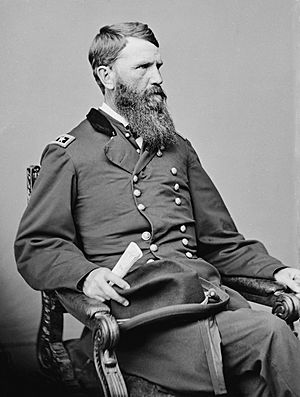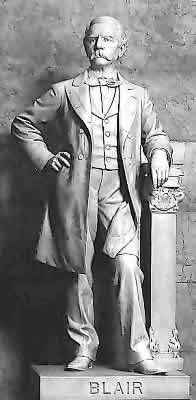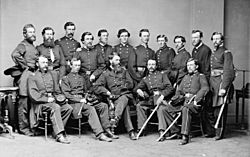Francis Preston Blair Jr. facts for kids
Quick facts for kids
Francis Preston Blair Jr.
|
|
|---|---|
 |
|
| United States Senator from Missouri |
|
| In office January 20, 1871 – March 4, 1873 |
|
| Preceded by | Daniel T. Jewett |
| Succeeded by | Lewis V. Bogy |
| Member of the U.S. House of Representatives from Missouri's 1st district |
|
| In office March 4, 1857 – March 3, 1859 |
|
| Preceded by | Luther M. Kennett |
| Succeeded by | John R. Barret |
| In office June 8, 1860 – June 25, 1860 |
|
| Preceded by | John R. Barret |
| Succeeded by | John R. Barret |
| In office March 4, 1861 – June 10, 1864 |
|
| Preceded by | John R. Barret |
| Succeeded by | Samuel Knox |
| Personal details | |
| Born | February 19, 1821 Lexington, Kentucky, U.S. |
| Died | July 8, 1875 (aged 54) St. Louis, Missouri, U.S. |
| Political party | Democratic (before 1848, 1866–75) Free Soil (1848–54) Republican (1854–66) |
| Spouse |
Appoline Alexander
(m. 1847) |
| Children | 8 |
| Parent |
|
| Relatives | Montgomery Blair (brother) Benjamin Gratz Brown (cousin) |
| Education | Yale University University of North Carolina, Chapel Hill Princeton University (BA) Transylvania University |
| Signature | |
| Military service | |
| Allegiance | |
| Branch/service | U.S. Army (Union Army) |
| Years of service | 1861–1865 |
| Rank | |
| Commands | 1st Brigade, 4th Division, XV Corps 2nd Division, XV Corps XV Corps XVII Corps |
| Battles/wars | Mexican- American War American Civil War |
Francis Preston Blair Jr. (born February 19, 1821 – died July 8, 1875) was an important American leader. He served as a United States Senator and a Congressman. During the American Civil War, he was a Major General in the Union Army.
Blair was from Missouri. He worked hard to keep Missouri from joining the Confederacy when the Civil War began. He helped move many weapons from the St. Louis Arsenal to safety. This event, known as the Camp Jackson affair, caused more tension in Missouri.
Later, Blair became a major general and fought in key battles. He served under General William Tecumseh Sherman at Vicksburg and took part in Sherman's March to the Sea. After the war, he ran for Vice President in 1868. He continued to be involved in politics until his death.
Contents
Early Life and Education
Francis Preston Blair Jr. was born in Lexington, Kentucky. His father, Francis Preston Blair, was a well-known newspaper editor and politician. His brother, Montgomery Blair, also became famous as the Postmaster General under President Lincoln.
Young Blair went to schools in Washington, D.C.. He studied at Yale University and the University of North Carolina at Chapel Hill. He graduated from Princeton University in 1841. After that, he studied law at Transylvania University. He started practicing law in St. Louis in 1842.
Service in the Mexican-American War
In 1845, Blair traveled West. He joined General Stephen W. Kearny's group in Santa Fe, New Mexico, during the Mexican–American War. After the U.S. took control of the New Mexico Territory, Blair was made an attorney general there.
He worked with other leaders to create new American laws for the region. He also became a judge in the new court system. This showed his early skills in law and government.
Blair's Political Career
Blair was very interested in politics. He returned to St. Louis in 1847. He became known for his strong views against slavery. He supported the Free Soil Party, which wanted to stop slavery from spreading to new territories.
From 1852 to 1856, Blair served in the Missouri House of Representatives. In 1856, he was elected to the United States House of Representatives as a Republican. He gave important speeches about how to solve the problem of slavery. He even suggested helping freed slaves move to South and Central America.
Blair was a strong supporter of Abraham Lincoln. The Blair family had a close relationship with Lincoln. Lincoln once said that the Blairs were very loyal to each other and worked hard for what they believed in.
When Southern states started talking about leaving the Union, Blair helped form the Unconditional Union Party in Missouri. This group wanted to keep Missouri in the United States. They were ready to use their own local army, called the Home Guard, if needed.
Blair's Role in the Civil War
After South Carolina left the Union in December 1860, Blair believed that Southern leaders wanted Missouri to join the Confederacy. He quickly took action. He organized and equipped a group of several thousand volunteers called the Home Guard. These were made up of local citizens who supported the Union.
Blair and Captain Nathaniel Lyon moved weapons from the St. Louis Arsenal to Alton, Illinois, for safekeeping. On May 10, 1861, Lyon and the Home Guard captured several hundred state militia members who were planning to seize the arsenal. This event, known as the Camp Jackson affair, helped the Union in Missouri. However, it also made many pro-Confederate people in the state very angry.
Blair was appointed a colonel in the Missouri volunteers in July 1862. He quickly rose through the ranks. He became a brigadier general in August 1862 and a major general in November. He briefly resigned from the army to serve in Congress again, but President Lincoln asked him to return to military service.
Blair commanded troops in major battles. He led a division during the Siege of Vicksburg, a very important Union victory. He also fought in the battles around Chattanooga, Tennessee. He became one of General William Tecumseh Sherman's main commanders. Blair's XVII Corps played a key role in Sherman's famous campaigns in Georgia and the Carolinas, including the "March to the Sea."

After the War: Postbellum Activities
After the Civil War ended, Blair had spent much of his own money supporting the Union. He was left with little money. In 1866, he disagreed with the government's plans for Reconstruction in the South. Because of this, he left the Republican Party.
In 1868, Blair ran for Vice President as a candidate for the Democratic Party. He ran with presidential candidate Horatio Seymour. Blair gave some controversial speeches during the campaign. Many people believe these speeches caused the Democrats to lose the election.
In 1871, Blair was chosen by the Missouri Legislature to be a United States Senator. However, in November 1872, he suffered a stroke that left him paralyzed. He never fully recovered. Because of his health, he was not re-elected to the Senate in 1873.
Even though he was ill, Blair continued to be involved in politics. He learned to write with his left hand. He served as Missouri's state superintendent of insurance. Francis Preston Blair Jr. died on July 8, 1875, after a fall. He is buried in Bellefontaine Cemetery.
Family Life
In 1847, Francis Preston Blair Jr. married Appoline Alexander. They had eight children together.
Recognition and Legacy
Many people respected Francis Preston Blair Jr. General William Tecumseh Sherman said Blair was "one of the truest patriots, most honest and honorable men, and one of the most courageous soldiers this country ever produced." General Ulysses S. Grant also praised Blair's bravery and loyalty as a soldier.
In 1885, a statue of Senator Blair was put up in Forest Park in St. Louis. In 1899, the state of Missouri gave a marble statue of Blair to the U.S. Capitol for its National Statuary Hall Collection.
 | Claudette Colvin |
 | Myrlie Evers-Williams |
 | Alberta Odell Jones |


